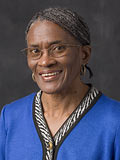 W
While reading Cassandra's booklist, "
Other Resources on Richard Wright," it dawned on me. I forgot about the children's picture book,
Richard Wright and the Library Card, by William Miller and illustrated by Gregory Christie.
As you can guess, the title is taken from our 4Ws selection,
Black Boy. Readers are given snapshots of our hero and his many ways to discover the written word as he ages. The story then fast-forwards to the fateful day Wright asks a coworker if he might borrow his library card. The exchange between a nervous Wright and nosy librarian makes for great copy. The acrylic and colored pencil illustrations of a stereotypical librarian, complete with hair bun and cat eye glasses, cracks me up.
Published in 1997, the dedication page reads, "For my son Julian, books are the road to the promised land."
As a teacher's resource, obviously, this book targets an elementary school audience. It has too many words for a group of toddlers or kindergarten class, but readers may entertain by glossing over the words with a paraphrased version.
Other ideas include celebrating Richard Wright's birthday and library card sign-up-month in September. Reading the book aloud to a group of six-year-old kids before awarding them with a personal library card, will surely be a program hit.
Can you think of another way to share this book with young readers? If so, please leave a comment below and I will add it to this post. ~ Maggie




















